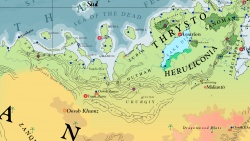Difference between revisions of "Massady Geth Mountains"
Trismegistus (talk | contribs) m |
Trismegistus (talk | contribs) m |
||
| (9 intermediate revisions by the same user not shown) | |||
| Line 1: | Line 1: | ||
[[File:MapMassadyGeths.jpg|thumb|250px|The Massady Geth Mountains of northern [[Danona]] ]] | [[File:MapMassadyGeths.jpg|thumb|250px|The Massady Geth Mountains of northern [[Danona]] ]] | ||
| − | The Massady Geth Mountains are the longest mountain chain in the continent of [[Danona]]. The stretch east-west across the northern half of the continent and divide the dry mediterranean climate in the north from the semi-arid and arid climates to the south. The Massady Geth Mountains are the highest range in Danona | + | The Massady Geth Mountains [<''Khahonri'' Jath Massadiyutha] are the longest mountain chain in the continent of [[Danona]]. The word 'Geth' (cf Jath from Khahonri) means a saw and is comparable in its meaningful sense to the word 'Sierra' from Spanish. The stretch east-west across the northern half of the continent and divide the dry mediterranean climate in the north from the semi-arid and arid climates to the south. The Massady Geth Mountains are the highest range in Danona and the tallest peak reaches up to twenty four [[DF]] (3870m, 12,697ft) in elevation above sea levels. The Massady Geth Mountains are some of the mountains least inhabited by humans in the [[Pallathantic Region]]. The central Massady Geths are home to several [[humanlike]] tribes, including half-orcs, orcs, and minotaurs. Many valleys and mountain plateaus have only close-knit, tribal customs with orcish chieftains and for this reason, travel in the Massady Geths can be extremely dangerous for civilized persons. Parallel or nearly parallel to the Massady Geths are the neighboring [[Ubralyakh Geth Mountains]] and [[Khamial Geth Mountains]]. [[Magdeology|Magdeologers]] consider the [[Ephysgæe Mountains]] to be the eastern end of the Massady Geths, although historically and culturally they are considered separate. The valley of the [[Sanoman Forest]] separates the two mountain chains. |
| + | |||
| + | [[File:SierraEscarpmentCA.jpg|thumb|250px|The steep Massady Geths or Sierras of north Danona are often capped with snow in the winter, despite the dry warm climate of central Danona.]] | ||
=See Also= | =See Also= | ||
| + | *[[Community of Jephuzite Monks]] | ||
*[[Danona]] | *[[Danona]] | ||
*[[Heruliconia]] | *[[Heruliconia]] | ||
| Line 9: | Line 12: | ||
[[Category:Atlas]] | [[Category:Atlas]] | ||
| − | [[Category: | + | [[Category:Mountain Chains of Asdar]] |
[[Category:Mountains of Danona]] | [[Category:Mountains of Danona]] | ||
{{stub}} | {{stub}} | ||
Latest revision as of 10:53, 8 October 2017

The Massady Geth Mountains [<Khahonri Jath Massadiyutha] are the longest mountain chain in the continent of Danona. The word 'Geth' (cf Jath from Khahonri) means a saw and is comparable in its meaningful sense to the word 'Sierra' from Spanish. The stretch east-west across the northern half of the continent and divide the dry mediterranean climate in the north from the semi-arid and arid climates to the south. The Massady Geth Mountains are the highest range in Danona and the tallest peak reaches up to twenty four DF (3870m, 12,697ft) in elevation above sea levels. The Massady Geth Mountains are some of the mountains least inhabited by humans in the Pallathantic Region. The central Massady Geths are home to several humanlike tribes, including half-orcs, orcs, and minotaurs. Many valleys and mountain plateaus have only close-knit, tribal customs with orcish chieftains and for this reason, travel in the Massady Geths can be extremely dangerous for civilized persons. Parallel or nearly parallel to the Massady Geths are the neighboring Ubralyakh Geth Mountains and Khamial Geth Mountains. Magdeologers consider the Ephysgæe Mountains to be the eastern end of the Massady Geths, although historically and culturally they are considered separate. The valley of the Sanoman Forest separates the two mountain chains.
See Also
| This article is a stub. It requires further development by the creator. |
